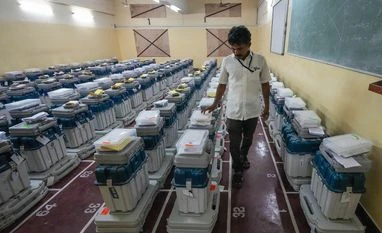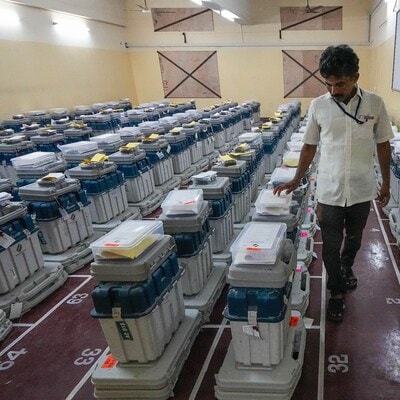The Election Commission has received eight applications for validation of EVMs used in the 18th Lok Sabha elections and three applications for validation of EVMs used in state assembly elections in Andhra Pradesh and Odisha.
)
Vasudha Mukherjee New Delhi
How will the EC conduct mock polls to test the EVMs?
The Election Commission plans to conduct mock polls in identified voting machines to establish the validity of the EVMs. During the mock polls, candidates can either vote themselves or appoint a representative. Moreover, candidates can place the three parts of the EVM — the control unit, the voting unit, and the Voter Verifiable Paper Audit Trail unit (VVPAT) — in any order without affecting the functioning of the machine. Cross-checking of VVPAT votes with EVM counts will also be part of this process.
Click here to connect with us on WhatsApp
The control unit controls the functioning of the EVM, the polling unit displays the name of the party and the candidate, and the VVPAT prints the ballot paper with the candidate’s symbol for voter verification. Normally, the polling unit connects to the VVPAT, which in turn connects to the control unit. However, the EC allows alternate connections to meet verification requirements.
Supreme Court EVM ruling
On April 26, the Supreme Court had rejected the demand for 100% verification of VVPAT votes against EVM tally. However, it directed the Election Commission to seal and store the Symbol Loading Units (SLUs) for 45 days after the announcement of the results. The SLUs, which upload the election symbols to the VVPAT machines, will be inspected along with the EVMs.
The Supreme Court, in its ruling, allowed second and third position candidates to seek verification of burnt memory or microcontrollers of five per cent of EVMs per assembly segment or constituency.
The Election Commission had on June 1 issued an administrative standard operating procedure (SOP) stipulating that candidates must apply for verification within seven days of the election results, unless an election case is filed and special permission is obtained from the High Court. Candidates will also have to deposit Rs 40,000 per EVM.
The technical standard operating procedure detailing the burn-in memory verification process is expected to be released this week. Subsequently, the Election Commission has received eight applications for verification of EVMs used in the 18th Lok Sabha elections and three applications for verification of EVMs used in the state assembly elections in Andhra Pradesh and Odisha.

